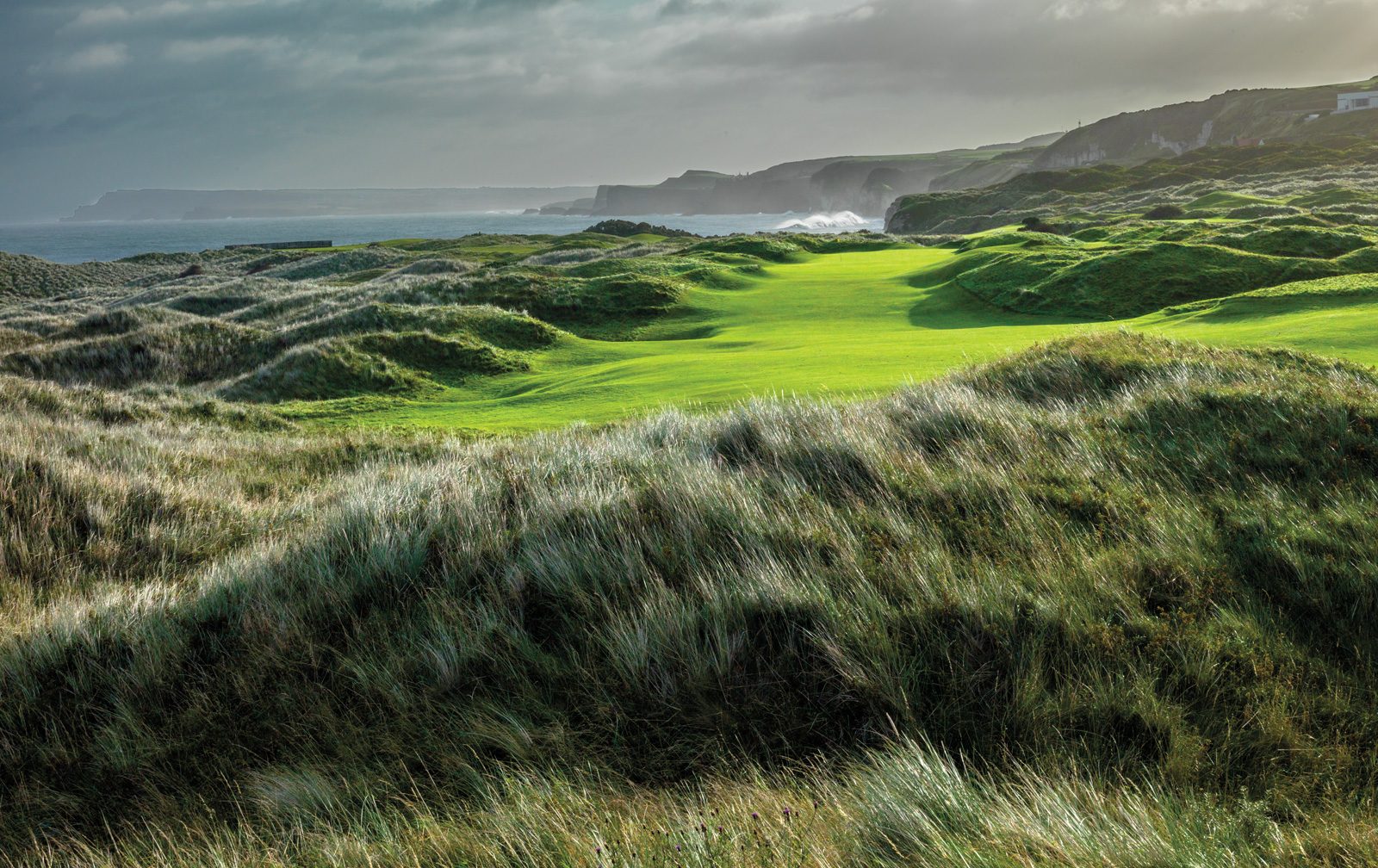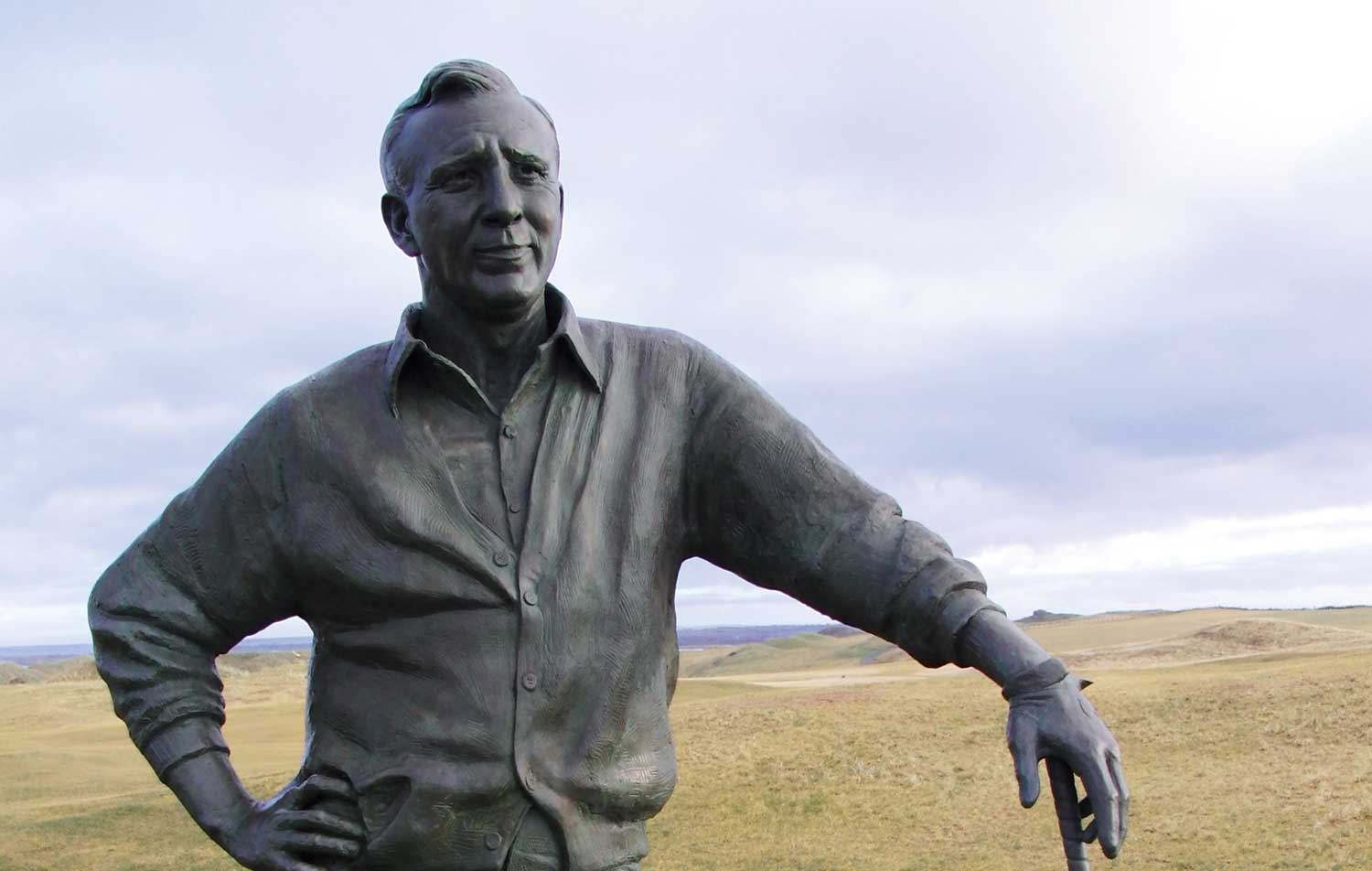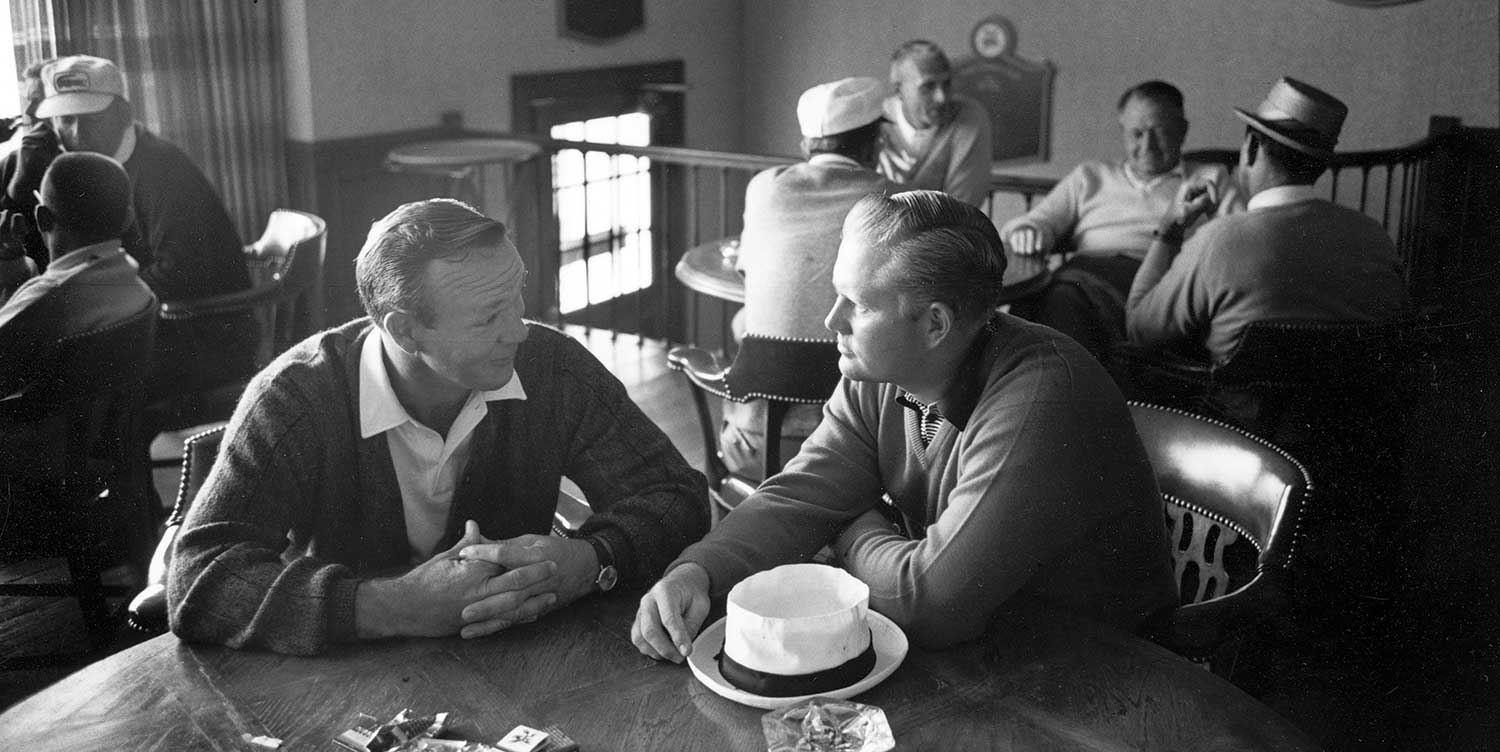
At the last count we believe Arnold Palmer was a member at 76 golf clubs around the world. 76. Palmer’s former personal assistant Doc Giffin recalls some of Palmer’s most notable affiliations
Several crafted boxes rested on the front edge of Arnold Palmer’s cluttered desk for many years in his memorabilia-laden hometown office in Latrobe, Pennsylvania. One was a silver box he received as winner of his first Masters in 1958—engraved with the signatures of all of that year’s contestants—another was acquired by the Eisenhower Trophy for Arnold’s victory in the 1962 Palm Springs Desert Classic. Both boxes contained a variety of cards—paper, plastic and a lone metal one—reflecting memberships in a wide range of organizations, mostly for the vast number of golf and country clubs to which he belonged.
They accounted for most of Arnold’s 76 different club memberships, many prominent, a few rather obscure, from around the world. If you throw in some 25 TPC courses to which all PGA Tour members have access, the total exceeds 100 and there may be more, since not every club sent him a card or did more than notify him of the bestowal. Most of the membership clubs are located in the United States but the list includes seven in Scotland, two each in England, Canada and Ireland and others in the Philippines and Thailand.
Interestingly but not surprisingly, he was a member or honorary member of all the clubs that hosted his seven major championship victories (Augusta National, Cherry Hills, Royal Birkdale and Royal Troon), three of his senior majors (Oakland Hills and Canterbury), the host of the 1954 U.S. Amateur that inspired his pro career (Country Club of Detroit) and the one that got away—the 1962 U.S. Open at Oakmont, a club Palmer admired ever since his teenage years in Western Pennsylvania. Even The Royal and Ancient Golf Club of St Andrews bestowed Arnold with an honorary membership.
“Arnold Palmer was a true gentleman and a truly iconic figure in sport,” says the Royal & Ancient. “His contribution to The Open is immeasurable. We were proud to have him as an honorary member of The Royal and Ancient Golf Club of St Andrews and he will forever be remembered as a wonderfully charismatic and global champion of our game.”
Several clubs went well beyond merely extending Arnold a membership. Cherry Hills, for one, has a statue of Arnold fronting its Hall of Champions, where the memorabilia includes the club he used for his storied drive onto the first green that spurred the final-round 65 and brought him his lone U.S. Open Championship in 1960. Cherry Hills bestowed the honorary membership at a 1967 ceremony.
Oakland Hills, where he scored an exciting playoff victory in the 1981 U.S. Senior Open, staged an elaborate dinner party to present that membership with two of Detroit’s all-time sports heroes—hockey’s Gordie Howe and baseball’s Al Kaline—on hand for the honor.
Canterbury created a special area in its clubhouse to toast Arnold, who not only carved out back-to-back Senior TPC Championships in 1984 and 1985 there but also played the course on occasion while enjoying considerable success during his Coast Guard and later amateur days in the Cleveland area.
Another golf course that Arnold loved to visit, dating back to his amateur days, was the famous Pine Valley Golf Club, on the New Jersey side of Philadelphia.
“Arnold was the most charismatic gentleman I have ever known,” remembers Gordon Brewer, former president at Pine Valley. “He looked you straight in the eye when speaking to you, making you feel to be his sole focus at that time. His being a Pine Valley member was a tremendous source of pride.
“Arnold attended the Spring Members Weekend in 1998 and he could not have been more gracious. I had the privilege of watching him interact with the gallery as a member of his foursome and his charisma was genuine and exceptional. Arnold was perhaps the greatest ambassador the game has ever known and having him as a Pine Valley member was extra special.”
A unique statue stands at Weston Golf and Country Club in Toronto, where Arnold won the 1955 Canadian Open, his first PGA Tour title. Located near the first tee, on a hole appropriately called “Arnie’s First,” it shows a grinning winner hugging the championship trophy. Weston marked the 50th anniversary of that victory with a celebration that Arnold flew north to attend.
“Words cannot describe the high regard in which Mr. Palmer is held here at the club,” says Jeremey J. MacRae, Chief Operating Officer, Weston G&CC. “Our membership is extremely proud of the association with Mr. Palmer and our statue of Mr. Palmer is a key illustration of that. It remains on proud and prominent display. People like to walk past the statue and perhaps tap it and there are frequent post-game photo ops taken with it. The statue and Arnold Palmer’s legacy are significant parts of our club culture and of the experience people have at Weston.”

Palmer’s company designed both of the Irish courses where Arnold was a member; the K Club at Kildare, near Dublin, which was site of the 2006 Ryder Cup Match, and Tralee, the highly-regarded links course that boasts a statue of him.
“Mr. Palmer came over in 2001,” recalls Anthony Byrne, General Manager at Tralee, which occupies a terrific parcel of linksland in south-west Ireland. “He played 18 holes and partnered Richard Rafferty (captain at the time) versus David Power (club pro) and Jim Dooley (chairman of management committee). Mr. Palmer holed out from a bunker on the 16th to win that match. It is like an amphitheater around the 16th green so there were people all around and there was a lot of noise and commotion when the ball went in, and Mr. Palmer was pretty excited about it himself. It was just one of the most amazing days; no wind, which is so unusual here, and blue skies.
“That day Mr. Palmer had one of the best caddies we ever had carrying his bag, Chucky O’Connell, and Chucky was singing songs in the men’s locker room after their round. Something, I would say, that Mr. Palmer had probably never experienced in all his life and in all the locker rooms he’d been through!
“Would you believe, Mr. Palmer wrote to Chucky afterwards, so Chucky must have made some impression. They got on like a house on fire. Chucky, who died a couple years ago, was a real character and he actually had a good singing voice, and he sung Irish songs like The Rose of Tralee. They had a hoot.
“Then Mr. Palmer presented some medals to our juniors and held a Q&A for our members. He was so entertaining, hilarious at times, and it was just great for our members to be able to spend that time with him.”
Yet another figurine stands outside the clubhouse at Laurel Valley, the distinguished golf club in Ligonier that is figuratively next door to Palmer’s hometown and has hosted a PGA Championship, a Ryder Cup, a Tour better-ball event for three years and two senior majors. Arnold was involved with Laurel Valley from its founding in the late 1950s and turned down an offer to become the first head professional there, wisely wanting to remain a full-time player on the PGA Tour. Nevertheless, as a member he maintained close ties with the club over the years, influencing its selection for many of those important events and overseeing modifications and alterations of the course from time to time. It was with great pride that Arnold captained the U.S. Ryder Cup team at Laurel Valley in 1975.

Besides Laurel, Oakmont and, of course, his own Latrobe Country Club, Palmer had other memberships in Western Pennsylvania; at the exclusive nearby Rolling Rock Club, plush resort Nemacolin Woodlands, Treesdale—a 27-hole club designed by the Palmer company that is the core of an extensive residential community in suburban Pittsburgh—and Indian Lake, a second-home village in the mountains east of Latrobe, where he laid out his first course in the mid-1960s.
That project lured him into the design business, which has been responsible for the more than 300 courses his company has produced over the years around the world. Indian Lake honored him a decade ago when they converted a dying tree that he had kept in the fairway of the 11th hole (formerly the 1st) into a wooden statue, thanks to the skill of a chainsaw artist.
Besides Latrobe, another obvious membership was at his long-time winter home at Bay Hill in Orlando, which he and partners acquired in the late 1960s and which has been the site of the Arnold Palmer Invitational since 1979. Close by is Isleworth, an upscale gated community that developed around the golf course Arnold designed on property that once abounded with orange groves among the area’s Butler chain of lakes. He also had a vacation home and membership at Tradition Golf Club at LaQuinta, where he designed one of a handful of courses in the Palm Springs area of California.
Another of his Palm Springs memberships was at Bermuda Dunes, which was one of the original courses on which the long-time PGA Tour tournament in Palm Springs was played and was the site of his 62nd and last regular tour victory. It was developed by Ernie Dunlevie, another close friend and key tournament official who set aside a condominium at Bermuda Dunes for Arnold to use whenever he was there.
Arnold’s friendship with Delvin Miller, the Hall-of-Fame harness racing driver, led to the choice of the Palmer company to create Adios Golf Club in South Florida and to Arnold’s honorary membership there. Adios, owned by Miller, was one of the most successful harness horses in the sport’s history.
When it came to designing golf courses, Arnold stayed in touch with clubs afterwards as much as he could and he got a real kick out of seeing golfers enjoy a golf course he had designed.
“Mr. Palmer not only enjoyed designing the courses, but importantly he made connections with the people,” recalls Gerry Byrne, Resort Superintendent at the K Club in Ireland, “from members to greenkeepers to the friends he made having a quiet Guinness in our local pub.
His ‘thumbs up’ in gratitude to the Irish welcome he received will be forever remembered by his friends at The K Club.”
Another close friend of long standing—former United Airlines chief executive Dick Ferris—brought Arnold into the consortium that acquired the famed and lucrative Pebble Beach properties in Northern California. That, too, produced a membership. Ironically, the Bing Crosby tournament there (now the AT&T) was one of the few tournaments Arnold played regularly yet failed to win, despite a couple of near-misses.
Lastly, Arnold had a special tie to the New Golf Club, which has club quarters overlooking the Old Course in St. Andrews, Scotland. An honorary member, he provided an annual trophy that went to the club’s player of the year.
Oh, about that metal card. It is a gold one that he treasured. With it he became a life member of Latrobe Country Club at a ceremony held to toast him after his 1958 Masters victory and long before he became the owner of the club on which he grew up and fashioned his tremendous game.
Follow Us On


| Cookie | Duration | Description |
|---|---|---|
| cookielawinfo-checkbox-analytics | 11 months | This cookie is set by GDPR Cookie Consent plugin. The cookie is used to store the user consent for the cookies in the category "Analytics". |
| cookielawinfo-checkbox-functional | 11 months | The cookie is set by GDPR cookie consent to record the user consent for the cookies in the category "Functional". |
| cookielawinfo-checkbox-necessary | 11 months | This cookie is set by GDPR Cookie Consent plugin. The cookies is used to store the user consent for the cookies in the category "Necessary". |
| cookielawinfo-checkbox-others | 11 months | This cookie is set by GDPR Cookie Consent plugin. The cookie is used to store the user consent for the cookies in the category "Other. |
| cookielawinfo-checkbox-performance | 11 months | This cookie is set by GDPR Cookie Consent plugin. The cookie is used to store the user consent for the cookies in the category "Performance". |
| viewed_cookie_policy | 11 months | The cookie is set by the GDPR Cookie Consent plugin and is used to store whether or not user has consented to the use of cookies. It does not store any personal data. |